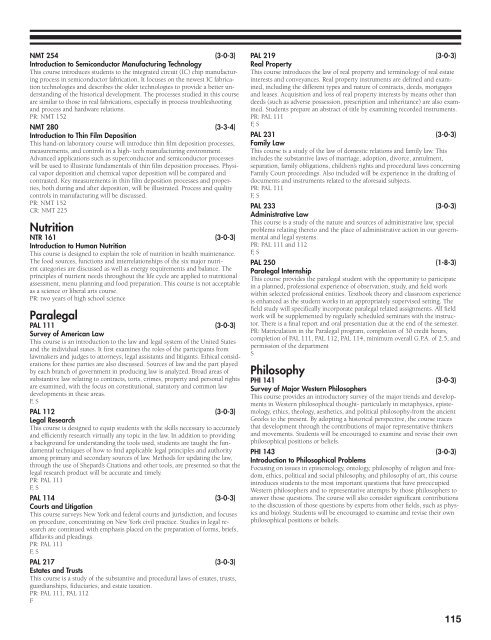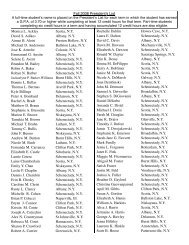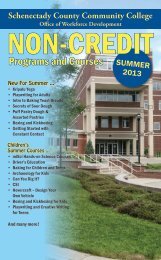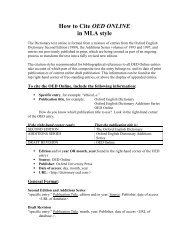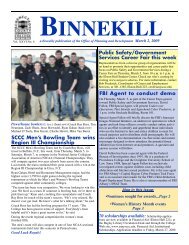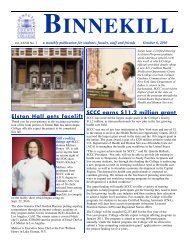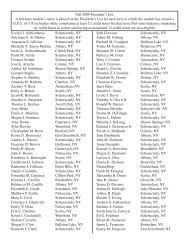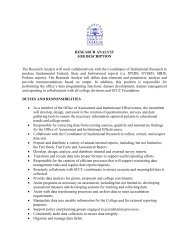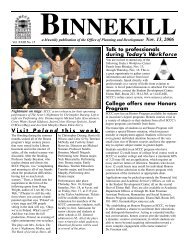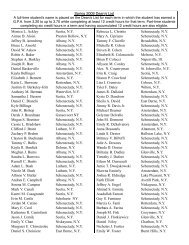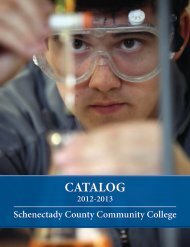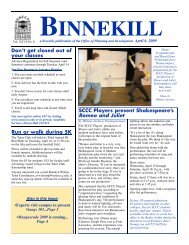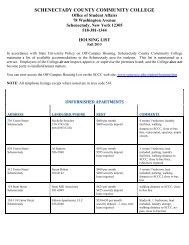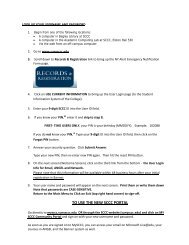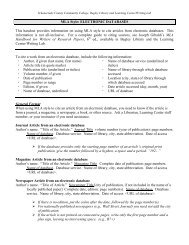2011-2012 CaTalog - Schenectady County Community College
2011-2012 CaTalog - Schenectady County Community College
2011-2012 CaTalog - Schenectady County Community College
- No tags were found...
Create successful ePaper yourself
Turn your PDF publications into a flip-book with our unique Google optimized e-Paper software.
NMT 254 (3-0-3)Introduction to Semiconductor Manufacturing TechnologyThis course introduces students to the integrated circuit (IC) chip manufacturingprocess in semiconductor fabrication. It focuses on the newest IC fabricationtechnologies and describes the older technologies to provide a better understandingof the historical development. The processes studied in this courseare similar to those in real fabrications, especially in process troubleshootingand process and hardware relations.PR: NMT 152NMT 280 (3-3-4)Introduction to Thin Film DepositionThis hand-on laboratory course will introduce thin film deposition processes,measurements, and controls in a high- tech manufacturing environment.Advanced applications such as superconductor and semiconductor processeswill be used to illustrate fundamentals of thin film deposition processes. Physicalvapor deposition and chemical vapor deposition will be compared andcontrasted. Key measurements in thin film deposition processes and properties,both during and after deposition, will be illustrated. Process and qualitycontrols in manufacturing will be discussed.PR: NMT 152CR: NMT 225NutritionNTR 161 (3-0-3)Introduction to Human NutritionThis course is designed to explain the role of nutrition in health maintenance.The food sources, functions and interrelationships of the six major nutrientcategories are discussed as well as energy requirements and balance. Theprinciples of nutrient needs throughout the life cycle are applied to nutritionalassessment, menu planning and food preparation. This course is not acceptableas a science or liberal arts course.PR: two years of high school scienceParalegalPAL 111 (3-0-3)Survey of American LawThis course is an introduction to the law and legal system of the United Statesand the individual states. It first examines the roles of the participants fromlawmakers and judges to attorneys, legal assistants and litigants. Ethical considerationsfor these parties are also discussed. Sources of law and the part playedby each branch of government in producing law is analyzed. Broad areas ofsubstantive law relating to contracts, torts, crimes, property and personal rightsare examined, with the focus on constitutional, statutory and common lawdevelopments in these areas.F, SPAL 112 (3-0-3)Legal ResearchThis course is designed to equip students with the skills necessary to accuratelyand efficiently research virtually any topic in the law. In addition to providinga background for understanding the tools used, students are taught the fundamentaltechniques of how to find applicable legal principles and authorityamong primary and secondary sources of law. Methods for updating the law,through the use of Shepard’s Citations and other tools, are presented so that thelegal research product will be accurate and timely.PR: PAL 111F, SPAL 114 (3-0-3)Courts and LitigationThis course surveys New York and federal courts and jurisdiction, and focuseson procedure, concentrating on New York civil practice. Studies in legal researchare continued with emphasis placed on the preparation of forms, briefs,affidavits and pleadings.PR: PAL 111F, SPAL 217 (3-0-3)Estates and TrustsThis course is a study of the substantive and procedural laws of estates, trusts,guardianships, fiduciaries, and estate taxation.PR: PAL 111, PAL 112FPAL 219 (3-0-3)Real PropertyThis course introduces the law of real property and terminology of real estateinterests and conveyances. Real property instruments are defined and examined,including the different types and nature of contracts, deeds, mortgagesand leases. Acquisition and loss of real property interests by means other thandeeds (such as adverse possession, prescription and inheritance) are also examined.Students prepare an abstract of title by examining recorded instruments.PR: PAL 111F, SPAL 231 (3-0-3)Family LawThis course is a study of the law of domestic relations and family law. Thisincludes the substantive laws of marriage, adoption, divorce, annulment,separation, family obligations, children’s rights and procedural laws concerningFamily Court proceedings. Also included will be experience in the drafting ofdocuments and instruments related to the aforesaid subjects.PR: PAL 111F, SPAL 233 (3-0-3)Administrative LawThis course is a study of the nature and sources of administrative law, specialproblems relating thereto and the place of administrative action in our governmentaland legal systems.PR: PAL 111 and 112F, SPAL 250 (1-8-3)Paralegal InternshipThis course provides the paralegal student with the opportunity to participatein a planned, professional experience of observation, study, and field workwithin selected professional entities. Textbook theory and classroom experienceis enhanced as the student works in an appropriately supervised setting. Thefield study will specifically incorporate paralegal related assignments. All fieldwork will be supplemented by regularly scheduled seminars with the instructor.There is a final report and oral presentation due at the end of the semester.PR: Matriculation in the Paralegal program, completion of 30 credit hours,completion of PAL 111, PAL 112, PAL 114, minimum overall G.P.A. of 2.5, andpermission of the departmentSPhilosophyPHI 141 (3-0-3)Survey of Major Western PhilosophersThis course provides an introductory survey of the major trends and developmentsin Western philosophical thought- particularly in metaphysics, epistemology,ethics, theology, aesthetics, and political philosophy-from the ancientGreeks to the present. By adopting a historical perspective, the course tracesthat development through the contributions of major representative thinkersand movements. Students will be encouraged to examine and revise their ownphilosophical positions or beliefs.PHI 143 (3-0-3)Introduction to Philosophical ProblemsFocusing on issues in epistemology, ontology, philosophy of religion and freedom,ethics, political and social philosophy, and philosophy of art, this courseintroduces students to the most important questions that have preoccupiedWestern philosophers and to representative attempts by those philosophers toanswer those questions. The course will also consider significant contributionsto the discussion of those questions by experts from other fields, such as physicsand biology. Students will be encouraged to examine and revise their ownphilosophical positions or beliefs.115


